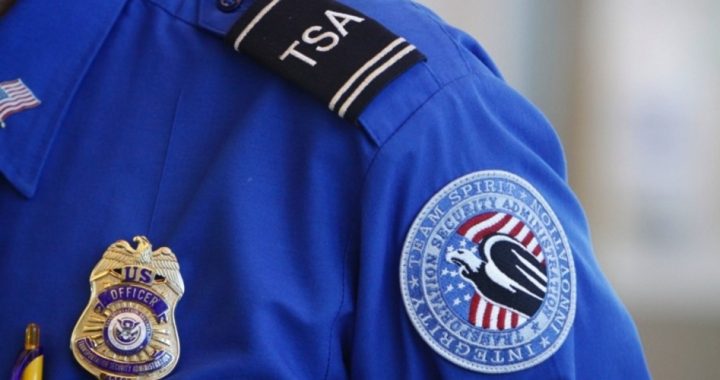
“Every consideration that can influence the human mind, such as honor, oaths, reputations, conscience, the love of country, and family affections and attachments, afford security for their fidelity.”
— John Jay, Federalist, No. 64
Senator and Republican presidential candidate Ted Cruz (R-Texas) has moved into second place in latest polls behind Donald Trump. While some conservatives and constitutionalists might consider this a move in the right direction, recent news out of Texas might be cause for concern.
Despite describing himself as the only “consistent conservative” among the 14 Republicans seeking the GOP nomination, Ted Cruz seems to have silently dropped one of the most despised federal agencies from his list of departments he would abolish if he were elected president.
A story published by the Texas Tribune reveals that the government’s official gropers — the Transportation Security Administration — are no longer on Cruz’s chopping block.
Earlier this month, U.S. Sen. Ted Cruz unveiled a list of agencies that he plans to eliminate if he’s elected president. His “Five for Freedom” plan targets the IRS and the Departments of Education, Commerce, Energy, and Housing and Urban Development. Noticeably absent from the list was the Transportation Security Administration.
When the paper asked the Cruz campaign to explain the exclusion, campaign spokesman Rick Tyler reportedly “declined multiple requests to say whether the senator and presidential candidate still supports eliminating the TSA.”
The article continues: “’Here is the list of agencies eliminated,’ Cruz spokesman Rick Tyler wrote in an email last week, alongside a link to a page on Cruz’s campaign website that lists 30 government agencies, commissions and programs that constitute his current hit list. The TSA is not on it.”
In 2012, however, in a post on his senatorial campaign’s Facebook page regarding the TSA’s treatment of Rand Paul (including Paul’s refusal to submit to the body scanner), Cruz wrote that “Texas needs a strong leader who will fight to end the invasive procedure, not a weak leader who will bow down to the Obama administration.”
That’s a pretty clear condemnation, so why the apparent waffling?
If Cruz has indeed changed his position regarding the TSA, a look at the connections of some of his campaign staff might offer some clues as to why.
For example, Chad Sweet is the chairman of the Ted Cruz presidential campaign, and Sweet’s own company made millions from the sale of body scanners to the TSA. Chad Sweet’s professional and political background betrays Cruz’s claims of being someone who promises “not to continue going in the same direction” and to “bring power out of Washington, and back to we the people.”
After serving as Director of the CIA, Chad Sweet served as an investment banker at Morgan Stanley and later vice president of Goldman Sachs. He later worked for the Department of Homeland Security during the Bush administration, and is the co-founder of the Chertoff Group, a security consulting company.
It’s that last connection that is cause for concern and may reveal cronyism to be the cause of Cruz’s increased tolerance of the TSA.
In 2010, just months after stepping down as secretary of the Department of Homeland Security, Michael Chertoff created controversy by calling for the installation of nearly-nude body scanners at airports, conveniently leaving out the fact that he would profit from the policy. As reported by the Huffington Post in 2010:
One example involves the company at the heart of the recent uproar over intrusive airport security procedures — Rapiscan, which makes the so-called body scanners. Back in 2005, Chertoff was promoting the technology and Homeland Security placed the government’s first order, buying five Rapiscan scanners.
After the arrest of the underwear bomber last Christmas, Chertoff hit the airwaves and wrote an op-ed in The Washington Post advocating the full-body scanning systems without disclosing that Rapiscan Systems was a client of his firm. The aborted terror plot prompted the Transportation Security Agency to order 300 machines from Rapiscan. Yet last spring, the Government Accountability Office reported that, “It remains unclear whether [the scanners] would have been able to detect the weapon” used in the aborted bombing attempt. And according to a recent report by DHS’s Inspector General, the training of airport screeners is rushed and poorly supervised.
The Rapiscan “nudie scanners” were removed from airports in 2013 and replaced with another type of scanner that uses radio waves. The new scanners show hidden objects on an avatar image on a screen, so the TSA agents no longer get to ogle the naked images of Americans.
Admittedly, these scanners are no longer located in our country’s airports. The problem remains, however, that for years Cruz’s chief campaign advisor personally pocketed from a policy that literally exposed thousands of Americans to the embarrassing necessity of having images of their bodies shown on screens just to be able to travel. And the TSA, of course, could still be considered a huge potential customer for the Chertoff Group.
Since the Cruz campaign is currently refusing to comment on the issue, and they probably wouldn’t admit it if it were true, this is all just speculation. But it definitely raises questions about Senator Cruz’s connections to the very big-government neoconservatives that he claims to be campaigning against.



